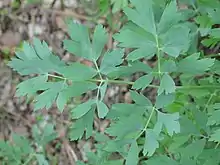| Lomatium californicum | |
|---|---|
 | |
| Scientific classification | |
| Kingdom: | Plantae |
| Clade: | Tracheophytes |
| Clade: | Angiosperms |
| Clade: | Eudicots |
| Clade: | Asterids |
| Order: | Apiales |
| Family: | Apiaceae |
| Genus: | Lomatium |
| Species: | L. californicum |
| Binomial name | |
| Lomatium californicum (Nutt.) Mathias & Constance | |
Lomatium californicum is a species of plant related to the carrot and the parsnip which is known by the common names California rock parsnip, celery weed, and California lomatium.[1]
This plant is native to California and Oregon.[2] It is found on mountains and hills, at elevations of 150–1,800 metres (490–5,910 ft).[3]
Description
Lomatium californicum grows to 3–12 decimetres (0.98–3.94 ft). It has coarsely toothed to lobed blue-green leaves. They resemble those of common celery in both appearance and taste.
The yellow flowers are in broad umbels of 1.5–3 decimetres (5.9–11.8 in) in diameter.[3]
Uses
It is a traditional Native American food source and medicinal plant, with various parts of the plant used, including by the Kawaiisu, Yuki, and Yurok peoples.[4] The Yuki chewed it while hunting to prevent deer from detecting human scents.[4] The Chumash called it chuchupaste (lit. plant of great virtue) and used it to cure headaches and stomach pain.[5]
References
- ↑ ITIS Standard Report Page: Lomatium californicum
- ↑ USDA: Lomatium californicum
- 1 2 Jepson: Lomatium californicum
- 1 2 University of Michigan at Dearborn: Native American Ethnobotany of Lomatium californicum
- ↑ Anderson, Kat (2005). Tending the Wild: Native American Knowledge and the Management of California's Natural Resources. Berkeley: University of California Press. p. 143. ISBN 978-0520280434.
External links
- Calflora Database: Lomatium californicum (California lomatium, celery weed)
- Jepson Manual eFlora (TJM2) treatment of Lomatium californicum
- USDA Plants Profile for Lomatium californicum (California lomatium)
- UC Photos gallery — Lomatium californicum